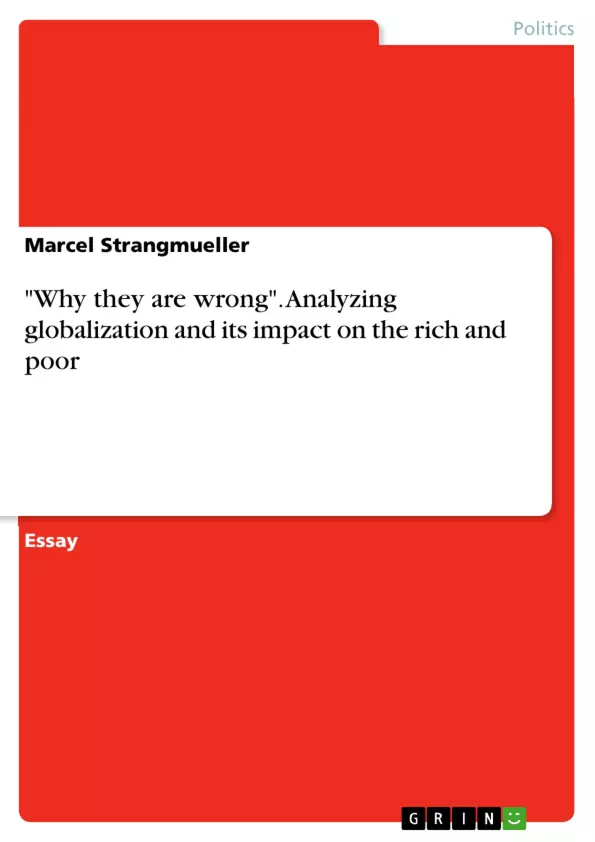Globalisation is a highly opinionated topic, which is discussed throughout the years, especially since Donald Trump won the election in 2016 who is now promoting a way of business which is considered to be more in the direction of protectionism rather than globalisation. Protectionism is supposed to protect producers, workers and businesses of the import-competing sector from other countries. Political tools to achieve such a protection of national business are tariffs, regulations on imported goods and other government regulations. This is against what the world has been moving towards in the past decades since WWII. Western society since then has promoted a more global approach of living, including migration, trade and problem solving.
Globalisation is described as the process of increasing the integration of internationally dispersed goods. These integrations include factors such as culture, society and economical, political and informational cooperation. All those factors contribute to the fact that the world is moving closer together rather than further away, how Donald Trump is suggesting. The world is becoming a "global village" with products available in countries that do normally not have access to them, such as bananas in the UK or a Mercedes in the United States.
Inhaltsverzeichnis (Table of Contents)
- Over the years there is a vast variety of definitions and descriptions about at what point a person is rich or poor.
- In the following the essay will discuss negative impacts globalization has on the poor people of the poor countries and on the poor or unskilled workers in the developed countries.
- Critics of globalisation use other arguments frequently, which include economical dangers within and between countries and how those economical factors impact politics and society.
- Another influence the globalisation of markets has, is on the society of developing countries. As the other points there are good and bad factors that can be argued for in this debate.
Zielsetzung und Themenschwerpunkte (Objectives and Key Themes)
This essay examines the argument that globalization primarily benefits the rich and disadvantages the poor. It aims to provide a balanced assessment of this claim, considering both positive and negative impacts of globalization. The analysis is based on the article "Why they're wrong" published in The Economist in 2016, which argues against the anti-globalization stance.
- Defining "rich" and "poor" in a global context
- Analyzing the impact of globalization on labor markets in developed and developing countries
- Exploring the economic risks and benefits of globalization
- Examining the social consequences of globalization on developing countries
Zusammenfassung der Kapitel (Chapter Summaries)
- The essay begins by establishing clear definitions of "rich" and "poor" based on international standards and purchasing power parity, using the United States as a benchmark for income levels. The author then defines "poor" countries based on their GNI per capita.
- This section discusses the negative impacts of globalization on poor people in both developing and developed countries. It examines how outsourcing of low-skilled jobs to countries with lower labor costs can harm workers in developed countries. The author also acknowledges the benefits of outsourcing for developing countries, including increased employment and economic growth.
- This section focuses on the economic consequences of globalization, arguing that interconnected markets can lead to both economic downturns and upswings. The author presents evidence of how investments and acquisitions in developing countries can positively impact their economies, while also acknowledging potential downsides such as displacement of local businesses.
- The final section delves into the social impacts of globalization. The essay examines how trafficking and corruption can negatively affect developing countries, exploiting vulnerable populations. However, it also highlights the positive role globalization plays in fostering cultural exchange and promoting healthcare advancements.
Schlüsselwörter (Keywords)
This preview examines the controversial topic of globalization and its impact on wealth distribution. It delves into the definitions of "rich" and "poor" within a global context, analyzes the influence of globalization on labor markets and economic structures, and investigates its social consequences. Key terms include globalization, economic development, purchasing power parity, outsourcing, labor markets, economic growth, social consequences, and developing countries.
Frequently Asked Questions
Does globalization only benefit the rich?
The essay provides a balanced view, acknowledging that while critics argue it favors the wealthy, it also creates employment and growth in developing nations.
What is "protectionism" in the context of globalization?
Protectionism uses tools like tariffs and regulations to protect national businesses from foreign competition, contrasting with the global integrated approach.
How does outsourcing affect labor markets?
Outsourcing can harm low-skilled workers in developed countries by moving jobs to lower-cost regions, but it simultaneously boosts economies in developing nations.
What are the social consequences of globalization?
Globalization can lead to negative impacts like trafficking and corruption, but also positive ones like cultural exchange and advancements in healthcare.
What does the term "global village" mean?
It describes a world where countries are increasingly integrated through trade, culture, and information, making products and ideas available everywhere.
- Quote paper
- Marcel Strangmueller (Author), 2017, "Why they are wrong". Analyzing globalization and its impact on the rich and poor, Munich, GRIN Verlag, https://www.grin.com/document/417202



